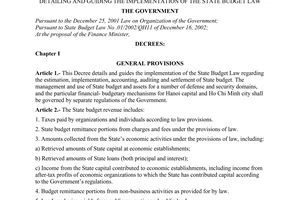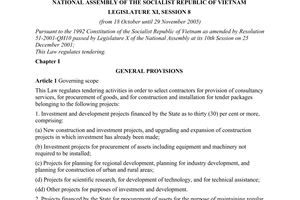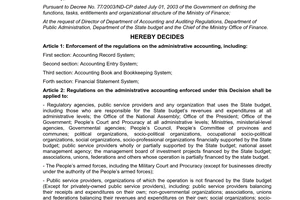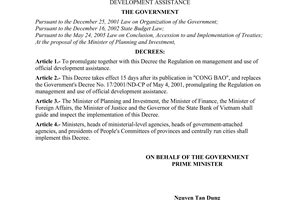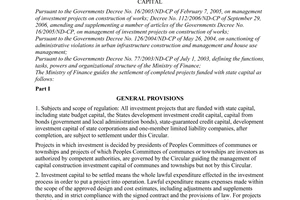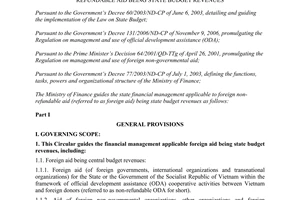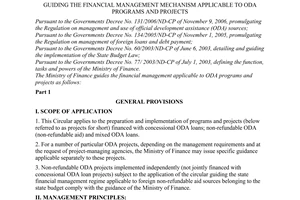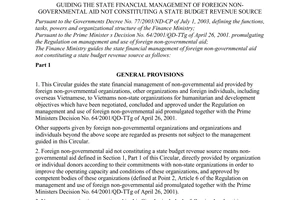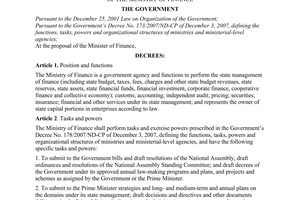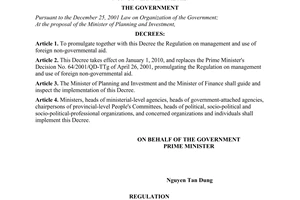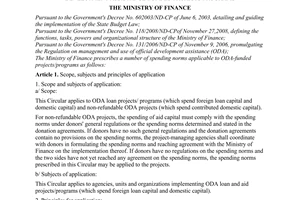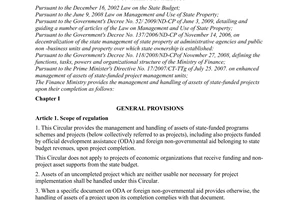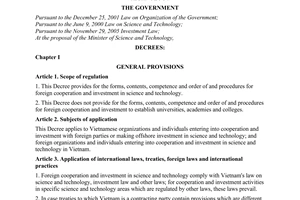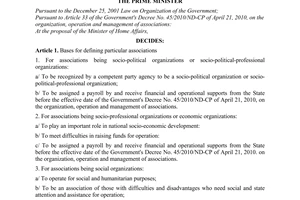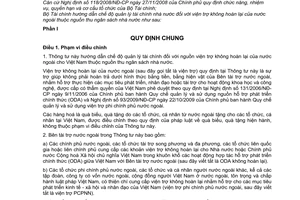Nội dung toàn văn Circular No. 225/2010/TT-BTC on the state financial management of non-refundable
|
THE
MINISTRY OF FINANCE |
THE
SOCIALIST REPUBLIC OF VIETNAM |
|
No. 225/2010/TT-BTC |
Hanoi, December 31st 2010 |
CIRCULAR
ON THE STATE FINANCIAL MANAGEMENT OF NON-REFUNDABLE AID CLASSIFIED AS STATE BUDGET REVENUES
Pursuant to the Government's Decree No. 60/2003/ND-CP dated June 06th 2003 elaborating and providing guidance on the implementation of the Law on State budget;
Pursuant to the Government's Decree No. 131/2006/ND-CP dated November 09th 2006 on the management and use of Official Development Assistance (ODA);
Pursuant to the Government's Decree No. 93/2009/ND-CP dated October 22nd 2009 on the management and use of foreign non-governmental aid;
Pursuant to the Government's Decree No. 118/2008/ND-CP dated November 27th 2008, defining the functions, tasks, powers and organizational structure of the Ministry of Finance;
The Ministry of Finance provide guidance on the state financial management of foreign non-refundable aid classified as State budget revenues:
Part I
GENERAL PROVISIONS
Article 1. Scope of regulation
1. This Circular provide guidance on the financial management of foreign non-refundable aid provided for Vietnam that is classified as State budget revenues.
Foreign non-refundable aid (hereinafter referred to as aid) in this Circular is non-refundable aid in cash or in kind provided by foreign parties aiming for the development, humanity purposes, or sponsoring science and technology activities approved by Vietnamese competent authorities in the Government's Decree No. 131/2006/ND-CP dated November 09th 2006 on the management and use of ODA and the Government's Decree No. 93/2009/ND-CP dated October 22nd 2009 on the management and use of foreign non-governmental aid.
Goods being donations made by foreign organizations and individuals to organizations and individuals in Vietnam regulated by current laws on donation are not regulated in this Circular.
2. Foreign donors in this Circular include:
a) Governments of other countries, bilateral and multilateral aid organizations, international organizations or inter-governmental organizations that provide non-refundable aid for the State or the Government of the Socialist Republic of Vietnam within the framework of cooperation in official development assistance between Vietnam and foreign donors (hereinafter referred to as non-refundable ODA).
b) Foreign non-governmental organizations, other foreign organizations and individuals, including corporations and companies funded by foreigners, Vietnamese communities overseas that comply with Vietnam’s law and are willing to provide non-refundable aid in order to assist in the socio-economic development and humanity in Vietnam.
3. Aid receivers in this Circular include:
a) Organizations affiliated to the governing apparatus of Vietnam, including the agencies of the Communist Party, the National Assembly, the Supreme People’s Court, the Supreme People’s Procuracy; Ministries, ministerial agencies, Governmental agencies (hereinafter referred to as Ministries); People’s Committees of central-affiliated cities and provinces (hereinafter referred to as provincial People’s Committees); Vietnamese Fatherland Front, Confederation of Labour, Communist Youth Union, Vietnam Farmers' Association, Vietnam Veterans’ Association, Vietnam Women’s Union.
b) State-owned enterprises of Vietnam.
c) The special associations of which personnel is decided by the State and funding is supported by the State, according to the Prime Minister’s Decision No. 68/2010/QD-TTg dated October 01st 2010 on special associations.
4. Other associations (apart from special associations in Point c Clause 3 above) established by social organizations, socio-professional organizations, economic organization, individuals, groups of individuals, or communities, of which funding is provided from non-state sources, are aid receivers prescribed in the Circular No. 109/2007/TT-BTC dated September 10th 2007 of the Ministry of Finance providing guidance on the state financial management of foreign non-governmental aid not being classified as State budget revenues.
5. Aid classified as central budget revenues include:
a) Non-refundable ODA;
b) Foreign non-governmental aid provided for the Government of Vietnam (not including foreign non-governmental aid provided for provincial People’s Committees and the units affiliated to provincial People’s Committees);
c) Foreign non-governmental aid provided for state-owned enterprises under the management of central agencies.
d) Foreign non-governmental aid provided for special associations prescribed in the Appendix to the Prime Minister’s Decision No. 68/2010/QD-TTg dated October 10th 2010.
6. Foreign aid classified as local budget revenues includes:
b) Direct foreign non-governmental aid provided for provincial People’s Committees and affiliated units;
c) Foreign non-governmental aid provided for state-owned enterprises under the management of local governments.
c) Foreign non-governmental aid provided for local special associations identified by the President of the provincial People’s Committee, according to the Prime Minister’s Decision No. 68/2010/QD-TTg.
Article 2. Subjects of application
1. The state authorities assigned to manage foreign aid;
2. Governing bodies of foreign aid projects;
3. Investors in projects funded by foreign partners.
Article 3. Principles of State financial management of non-refundable aid classified as State budget revenues
1. Foreign aid classified as State budget revenues provided for the aid receivers prescribed in this Circular shall be sufficiently recorded in the State budget as prescribed by the Law on State budget, in particular:
a) The Ministry of Finance is in charge of the revenues and expenditures of the central budget relating to the aid classified as central budget revenues (including central budget revenues recorded as targeted additional expenditures for local budget).
a) Services of Finance are in charge of the revenues and expenditures of local budgets relating to the aid classified as local budget revenues, and cooperate with the Ministry of Finance in recording the revenues and expenditures of local budgets relating to the aid classified as central budget revenues recorded as targeted additional expenditures for local budget)
2. Foreign aid regulated in this Circular shall only be received and used after competent authorities (specified in the Government's Decree No. 131/2006/ND-CP and Decree No. 93/2009/ND-CP) give approvals.
3. Aid receivers shall manage and use aid in accordance with Vietnam’s law, agreements and commitments to the donors. Where regulations or conditions for providing aid imposed by donors are at odds with Vietnam’s law, Vietnam’s law shall be complied with.
Article 4. Methods of aid provision
1. Aid in kind or cash:
Aid in kind or cash may be provided through programs/projects (including fundamental constructions) or non-project aid (separate aid, emergency aid in relieving consequences of disasters, epidemics, and wars).
2. Intangible aid:
Foreign intangible aid is donors transferring intellectual assets (patents, copyrights, industrial property rights, technology transfers) free of charge, or donors directly paying the costs of overseas training, visits, conventions, and consultancy.
Article 5. Interpretation of terms
In this Circular, the terms below are construed as follows:
1. Governing bodies mean Ministries, provincial People’s Committees, central agencies of associations and authorities in charge of state-owned enterprises.
2. “Project owners/grantees (hereinafter referred to as project owners) are organizations assigned by governing bodies to manage and use aid and counterpart fund to execute programs/projects, or receive non-project aid approved by competent authorities.
3. Balance-of-payments assistance is an aid method by which donors shall assist in balancing foreign currencies for Vietnam’s Government to import equipment and goods (or buy imported goods in Vietnam) according to the agreements on balance-of-payments assistance.
4. Direct budgeting assistance is an aid method by which financial aid is directly remitted to the State budget in order to support general expenditures of the State budget (general budgeting assistance) or expenditures on a specific economic sector (sectoral budgeting assistance)
5. Sectoral access assistance is an aid to a development program of a particular sector to provide resources and ensure the comprehensive and sustainable development of that sector.
Sectoral access assistance is rendered through a program that includes multiple sub-projects, participated by multiple governing bodies. One of them shall coordinate governing bodies of sub-projects.
6. Foreign aid under the management of Vietnam is an aid method by which donors shall transfer grants to Vietnamese project owners for them to management and execute the aid projects themselves in accordance with bilateral agreements This aid method includes the projects that follow the trust fund model of donors.
7. Foreign aid under the management of donors is an aid method by which donors directly manage the finance of projects or entrust a foreign non-governmental organization to execute the aid projects. When a project is done, the donor shall handover assets and project results to Vietnam.
8. Technical assistance is an aid method aiming to support the development of capability and of Vietnam, or provide technical input elements to prepare for and execute projects such as providing experts, training, support for equipment, documents, costs of visits, surveys, and conventions.
9. Commodity aid is direct aid in the form of commodities and supplies provided for Vietnam’s Government by foreign Governments. Commodities and supplies shall be put up for auction in Vietnam by the Ministry of Finance, and the receipts from the auctions shall be sent to the State budget or allocated to projects according to agreements among Governments.
10. Emergency aid is an aid method by which donors shall send money or commodities to victims when disasters, epidemics, or wars occur.
11. Non-project aid is separate aid that does not belong to any specific program or project, provided in the form of money, commodities, or experts (including voluntary experts).
Part II
SPECIFIC PROVISIONS
Article 6. Making financial plans for aid projects
1. Financial plans for aid projects are plans for disbursement of aid and counterpart fund of non-refundable ODA projects and foreign non-governmental aid projects (including capital plans for the preparation and execution of projects) made by project owners according to guidance on making financial plans of ODA projects in the Circular No. 108/2007/TT-BTC dated September 07th 2007 of the Ministry of Finance providing guidance on the financial management mechanism applicable to ODA programs and projects.
Financial plans for aid projects shall be conformable with the aid project documents approved by competent authorities, enclosed with description of the calculation basis.
Annual financial plans for aid projects shall be made according to Appendix 1 to this Circular.
2. Annually, when making the State budget estimates, project owners shall make financial plans together with budget estimates and send them to their governing bodies. The governing bodies (not estimating budget units level I) shall examine and summarize budget estimates of affiliated units and send reports to superior governing bodies being estimating units level I.
Central and local state authorities (estimating units level I) shall examine and integrate estimates made by affiliated units into the budget estimates under their management and send them to Finance authorities and Planning and Investment authorities at the same level.
After the annual budget estimate is decided by the National Assembly, the Prime Minister shall allocate budget, the Ministry of Finance and the Ministry of Planning and Investment shall notify other Ministries and local governments of their allocated budget.
3. For direct foreign assistance to the State budget according to sectoral access assistance programs:
When making annual the State budget estimates, according to the demand for aid disbursement in the year and the result of the program in the previous year, governing bodies shall estimate the need for aid of programs.
The Ministry of Finance shall cooperate with donors to determine the level of aid disbursement in the year and request project owners to make plans for distributing budget of programs, then send them to the Ministry of Planning and Investment and the Ministry of Finance. The Ministry of Planning and Investment and the Ministry of Finance shall summarize them and request the Government and the National Assembly to make decisions.
4. Direct aid for the State budget shall be included in annual estimates of State budget revenues and expenditures to cover general expense of the State budget. The making of estimates of direct aid for the State budget shall comply with current regulations on budget and international treaties and agreements signed (if any).
5. Financial plans for foreign non-project aid, commodity aid, emergency aid, or for projects under the management of donors are exempt. According to the actual financial or commodity aid or assets handed over by donors, the units assigned to receive and use non-project aid, commodity aid, and assets handed over from the projects under the management of donors shall send reports enclosed with aid documents to governing bodies and Finance authorities to initiate the procedure for certifying assistance and budget accounting.
6. Where an international treaty or agreement on the project is signed but has not taken effect, or has taken effect but the procedure for domestic investment is not completed, within the time limit for making the annual budget estimate, the governing body shall send a report to the Ministry of Planning and Investment and the Ministry of Finance for them to make provisions for fundamental construction or each administrative expenditure, and request competent authorities to make decision (if counterpart fund is provided by the central budget), or the project owner shall send reports to the local governing body for them to make provisions in the local budget and request competent authorities to make decisions (if counterpart fund is provided by the local budget).
7. For the aid projects approved after annual budget plans are made, governing bodies shall make additional budget plans. Governing bodies shall report minor, separate, and unscheduled foreign non-governmental aid in the year to Finance authorities and Planning and Investment authorities at the same level to handle on a case-by case basis, according to the notifications of aid disbursement sent by donors.
8. Annual financial plans for aid projects approved and announced by competent authorities are the basis for Finance authorities to withdraw aid, allocate counterpart fund and manage project finance.
9. Financial plans for minor aid projects that begin in one fiscal year and end in another shall be moved to the next year. The making of next year's financial plan is exempt.
Article 7. Aid certification
1. Aid certification is Finance authorities (the Ministry of Finance and Services of Finance) certifying imported goods and domestic goods and services purchases by financial aid or certifying the financial aid receives on Declarations of aid made by project owners.
2. The following cases are exempt from aid certification:
a) Financial aid in the form of direct budgeting assistance.
b) Intangible assistance:
3. The assignment to aid certification shall be consistent with the distribution of revenues among levels of budget, in particular:
a) The Ministry of Finance shall sign Declarations of:
- Foreign aid classified as central budget revenues in Clause 5 Article 1 of this Circular;
- Emergency aid without specific addresses approved by the President of Vietnamese Fatherland Front (specified in Article 15 of the Government's Decree No. 93/2009/ND-CP);
- Aid being imported commodities provided for some localities, received and distributed by one central state organization (imported commodities in the same bill of lading)
b) Services of Finance shall sign and certify the Declarations of foreign aid classified as local budget revenues prescribed in Clause 6 Article 1 of this Circular.
4. Purposes of Declarations of aid:
a) Finance authorities shall summarize information about the receipt and use of foreign aid and record foreign aid classified as State budget revenues.
b) A declaration of aid is one of legal documents for customs authority to decide the exemption of export and import duties, special excise duty (if any) and value-added tax when importing equipment, machinery, supplies, appliances, and commodities using foreign financial aid; or for tax authority to refund the value-added tax on goods and services purchased in Vietnam using foreign financial aid according to current laws on tax.
c) For project owners to monitor and administer foreign aid projects and make reports on the receipt and use of aid as prescribed in this Circular.
5. The forms of the Declarations of aid are provided in Appendix 2 to this Circular, including:
a) Form C1-HD/XNVT “Declarations of aid being imported commodities” is used for making declarations of aid in kind being machinery, equipment, supplies, raw materials, and commodities imported.
b) Form C2-HD/XNVT “Declarations of aid being domestic commodities and services” is used for making declarations of foreign aid being machinery, equipment, supplies, raw materials, and commodities purchased in Vietnam (including service fees) by foreign financial aid.
c) Form C3-HD/XNVT “Declaration of financial aid” is used for making declarations of foreign financial aid received.
6. A Declaration of aid shall be made into 06 original copies, including:
a) 03 original copies kept by Finance authorities; 02 of them are for State budget accounting and 01 of them is enclosed with the register of aid certification;
b) 01 original copy kept by the customs authority or tax authority and enclosed with the tax exemption or tax refund file;
c) 01 original copy kept by the governing body for monitoring and making reports on foreign aid;
d) 01 original copy kept by the project owner to make reports on the receipt and payment for aid projects/programs. Where multiple aid receivers are certified in the same Declaration, more original copies shall be made so that each unit shall keep 01 original copy of the Declaration.
If the aid is vehicles (boats, ships, bikes, cars), the project owner shall make 01 more original copy for vehicle registration.
7. Time of making Declarations of aid:
a) Form C1-HD/XNVT “Declaration of aid being imported commodities” shall be made right after the project owner receives invoice of imported goods.
a) Form C2-HD/XNVT “Declaration of aid being domestic commodities and services” shall be made right after the project owner receives invoice of commodities and services purchased in Vietnam.
c) Form C3-HD/XNVT “Declaration of financial aid” shall be made on receipt of the credit note made by the bank or the State Treasury where the account for receiving financial aid is opened
8. Papers enclosed with the Declarations of aid:
a) For the first declaration of aid, the project owner shall provide the Finance authority with legal documents proving the non-refundable aid, including:
- Specific International Agreements on ODA and written authorization of the Government to negotiate and sign such agreements as prescribed in the Government's Decree No. 131/2006/ND-CP dated November 09th 2006 on the management and use of Official Development Assistances;
- The memorandum of foreign non-governmental aid, the agreement on foreign non-governmental aid and the written approval for the receipt of foreign non-governmental aid prescribed in the Government's Decree No. 93/2009/ND-CP dated October 22nd 2009 on the management and use of foreign non-governmental aid;
- Written certification of aid, funding, donation (hereinafter referred to as funding) provided by the donor to support joint activities in science and technology, and the written decision made by a competent state authority on the receipt, management, and use of funding provided by a foreign organization or individual to serve science and technology activities prescribed in the Government's Decree No. 80/2010/ND-CP dated July 14th 2010 on international cooperation and investment in science and technology.
b) For projects participated by multiple agencies, when making the first Declaration of aid, the central project management board shall make more copies of the legal documents above (the quantity of copies depend on the quantity of localities that benefit from such programs/projects) and send them to the Ministry of Finance, the Ministry of Finance shall send them to relevant Services of Finance to monitor the management in cooperation and record the foreign aid to local budget.
c) The documents being basis for making each Declaration of aid such as import documents, invoices of goods and service purchased in Vietnam, decision on successful bid, and contracts (import contracts, entrusted import contracts, building contracts, sale contracts, consultancy contracts), final assessment record, record of handover and settlement of turnkey constructions funded by foreign partners; notes of aid disbursement or remittance made by donors, and relevant documents.
9. Location of aid certification
a) The Ministry of Finance: at the Department of Debt Management and External Finance – The Ministry of Finance in Hanoi (at 28 Tran Hung Dao Str.), or at the International Aid Receipt and Management Office affiliated to the Department of Debt Management and External Finance in Ho Chi Minh city (at 138 Nguyen Thi Minh Khai Str.) and in Da Nang city (at 64 Pasteur Str.).
b) Services of Finance: each local government shall decide the location and assigned a specialized unit or a department of the Service of Finance depending on the actual condition.
10. Some notes when making Declarations of aid:
a) Fill both sides of Declarations of aid C1, C2 and C3-HD/XNVT (do not make two 1-side papers). If the space in the form is not sufficient to provide detailed information (especially the information about financial aid and commodity aid), the project owner may provide detailed information on the Appendixes to that Declaration. These Appendixes shall also bear the signature and seal of the project owner.
b) The forms No. C1, C2 and C3-HD/XNVT are also used for making declaration of financial aid and commodity aid used to build the same turnkey fundamental construction. In this case, the project owner shall provide essential information about relevant fundamental constructions on the overleaf of the Declaration (in “aid for construction” box) to serve the making of financial statement of the fundamental construction after it is finished and handed over to Vietnam.
c) Prices on Declarations of aid:
- Form C1-HD/XNVT “Declaration of aid being imported commodities”: according to purchase prices on import invoices (FOG, CIF, C&F, etc.).
When the donor signs a contract to entrust the import or a bidding contract with a Vietnamese enterprise, apart from the declaration of prices according to import invoices mentioned above, the project owner shall make a declaration of the prices that have been actually paid by the donors using the aid. The actual purchase value is the basis for the Finance authority to record the budget revenues and expenditures relating to that aid.
- Form C2-HD/XNVT “Declaration of aid being domestic commodities and services” shall be made according to prices, exclusive and inclusive of tax (if any), on the invoices of domestic commodities and services The actual purchase value exclusive of tax is the basis for the Finance authority to record budget revenues and expenditures relating to that assistance.
d) Exchange rates on Declarations of aid:
- Where the donor has fix exchange rates in the agreement signed with Vietnam’s Government, the exchange rates agreed with the donor shall apply.
- Where the donor exchanges the foreign currencies for VND via commercial banks, including foreign banks in Vietnam, the actual exchange rates announced by such banks shall apply.
- Where the donor directly transfers foreign currencies to the project, the exchange rates annually announced by the Ministry of Finance on its website (http://www.mof.gov.vn) shall apply.
dd) For the purpose of facilitating the taxation process and State budget accounting, the information about the project owner on the Declarations of aid shall:
- Include accurate names and addresses of the project owner and their governing body.
- Include the code of the unit in financial relation to the project owner Where aid receivers are enterprises, public service providers, their tax codes shall be provided to facilitate tax refund.
Article 8. Opening accounts to receive financial aid
1. Project owners may open deposit accounts to receive foreign financial aid for each project at State Treasuries. Project owners may open accounts at commercial banks to serve the aid disbursement and payment if treaties or agreements on funding allow.
2. After such an account is opened, the project owner shall send a report to their governing body and Finance authority at the same level to monitor and manage them in cooperation.
3. It is prohibited to use personal accounts, to rent or borrow accounts of other units, or to open accounts overseas to receive foreign financial aid for projects. The violations above shall be penalized as prescribed by law.
Article 9. Aid disbursement
1. For financial aid in the form of direct budgeting assistance: foreign currencies shall be remitted to the foreign currency fund of the State budget. The sale of foreign currencies to the State bank shall be made according to the foreign currency sale plan approved by the Ministry of Finance.
2. For financial aid in the form of sectoral access assistance:
a) Where the treaty or agreement on the aid does not mention the disbursement via commercial banks, foreign currencies shall be transferred to the Foreign currency fund of the State budget as prescribed in Clause 1 of this Article.
b) Where the treaty or agreement on the aid allows the disbursement via commercial banks, the foreign financial aid shall be remitted to accounts of the Ministry of Finance (or project owner) at commercial banks.
3. For other financial aid not falling into the cases in Clause 1 and Clause 2 of this Article, the Ministry of Finance shall provide specific guidance at the request of governing bodies and project owners in accordance with the treaties and agreements on the aid and the Instruction on aid disbursement given by donors (if any).
Article 10. Recording state budget revenues and expenditures relating to foreign aid:
1. For financial aid in the form of direct budgeting assistance (prescribed in Clause 1 Article 9 of this Circular):
a) Recording state budget revenues: according to remittance notes, State Treasuries shall record State budget revenues as prescribed (except for the remittance of foreign currencies recorded as State budget revenues in foreign currencies).
b) Recording State budget expenditures: according to the treaties or agreements on aid and allocated budget, State Treasuries shall make payments, control the payments, and record State budget expenditures similarly to domestic capital sources.
2. For financial aid in the form of sectoral access assistance (prescribed in Clause 2 Article 9 of this Circular):
a) If foreign currencies are directly remitted to the State budget (according to Point a Clause 2 Article 9 of this Circular): budget revenues and expenditures shall be made in accordance with Clause 1 of this Article.
b) If aid is disbursed via special accounts held by the Ministry of Finance opened at commercial banks (the Department of Debt Management and External Finance):
- According to the need for expenditure of the project owner, the Ministry of Finance shall withdraw cash from special accounts and remit it to project owners’ accounts opened at State Treasuries.
- State Treasuries shall control expenditures similarly to domestic capital sources. If otherwise prescribed by treaties or agreements on aid, expenditures shall be controlled in accordance with such treaties or agreements.
- State budget accounting of aid classified as central budget revenues: the Ministry of Finance shall make and send record orders - Form C2-13/NS (hereinafter referred to as Form C2-13/NS) to State Treasuries to record expenditures on advanced payments for projects according to documents about the remittances from special accounts of the Ministry of Finance to project owners. Within 05 working days from the day on which the record order is received, governing bodies shall immediately notify project owners for monitoring future advanced payments.
Every quarter, project owners shall make and send reports on the use of aid (the expenditures are certified by State Treasuries) to the Ministry of Finance for making the Application for advanced payment of aid recorded – Form C2-14/NS (hereinafter referred to as Form C2-14/NS) and send it to a State Treasury to convert from advance payment into actual expense. Within 05 working days from the day on which the Application (Form C2-14/NS) is received, the governing body shall request project owners to monitor the use of aid.
- Recoding aid classified as central budget revenues: according to the notes of remittances from special accounts of the Ministry of Finance to project owners, the Ministry of Finance shall fill and send Form C2-13/NS to State Treasuries for recoding the State budget revenues and targeted additional expenditures for local budgets. The Services of Finance and local State Treasuries shall cooperate in recording local budget revenues and expenditures on advanced payments for projects. Every quarter, project owners shall make and send reports on the use of aid (of which expenditures are certified by State Treasuries) to Services of Finance for making and sending the Application (Form C2-14/NS) to local State Treasuries to convert from advance payment to actual expense.
c) If aid is disbursed via project owners’ accounts opened at commercial banks, the State budget shall be controlled and recorded similarly to direct financial aid for projects under the management of Vietnam specified in Clause 3 of this Article.
3. State budget accounting direct financial aid provided for projects under the management of Vietnam:
a) For aid classified as central budget revenues:
- The Ministry of Finance shall summarize Declarations of financial aid of every governing body in each quarter, thence fill and send Form C2-13/NS to State Treasuries for recording advanced payments (applicable to financial aid provided for central agencies); or targeted additional expenditures for local budget (applicable to financial aid provided for local agencies). After budget accounting is done, the Ministry of Finance shall send the Form C2-13/NS enclosed with the list of Declarations of financial aid according to each aid project to central governing bodies to monitor and refund advanced payments, or to Services of Finance for recording local budget revenues and make advanced payments to local project owners. Within 05 working days from the day on which the Form C2-13/NS is received, governing bodies shall immediately notify project owners for monitoring future advanced payments.
- Project owners shall send reports on advance payments for financial aid in each quarter to governing bodies being central and local estimating units level I to inspect, summarize, and send reports to the Ministry of Finance (or Services of Finance) to make Applications (Form C2-14/NS) and send them to State Treasuries to convert from advance payment to actual expense, then send 01 copy of the Application (Form C2-14/NS) to the governing body. Within 05 working days from the day on which the Application (Form C2-14/NS) is received, the governing body shall request project owners to monitor the use of aid.
Governing bodies shall inspect the accuracy and legitimacy of advance payment reports made by project owners under their management.
The deadline for refunding advanced payments for annual advance payments to project owners shall not be later than the deadline for adjusting the State budget settlement as prescribed by current regulations. The Minister of Finance shall consider and decide the extension of the deadline for refunding advanced payments
After the deadline for adjusting the State budget, the residual financial aid recorded as advanced payments for project owners that has not been paid shall be moved to the next year or be used subject to the decisions of donors.
b) For financial aid classified as local budget revenues: Services of Finance shall cooperate with provincial State Treasuries and governing bodies in recording local budget revenues and expenditures following the same procedure as financial aid classified as central budget revenues prescribed in Point a Clause 3 of this Article.
4. State budget accounting of aid in kind being commodities, supplies, and equipment to the State budget:
a) For aid classified as central budget revenues:
Annually, according to Declarations of aid, the Ministry of Finance shall make and send Form C2-13/NS to State Treasuries to record the expenditures on projects (applicable to the aid provided for projects under the management of central agencies), or targeted additional expenditures (applicable to the aid provided for projects under the management of local governments).
b) For aid classified as local budget revenues:
Annually, according to Declarations of aid, Services of Finance shall make orders to record local budget revenues and expenditures on projects, then send them to provincial State Treasuries to record local budget revenues and expenditures.
c) The regulations on State budget accounting in Points a and b above are only applicable to imported commodities or domestic commodities directly purchased and handed over to Vietnam by donors. For commodities, supplies, and equipment imported or purchased in Vietnam by project owners using financial aid, when making Declaration of aids, project owners shall mark the box “Finance authority shall not include items in this Declaration to the State budget because financial aid is certified” on the overleaf of the Declaration of aid, so that Finance authorities shall not record relevant financial aid and commodity aid twice.
5. State budget accounting of commodity aid provided for fundamental constructions in the form of turnkey aid.
Every quarter, Finance authorities shall summarize Declarations of aid in the form of commodities, equipment, or financial aid provided for each construction, thence fill and send Form C2-13/NS to State Treasuries for recording advanced payments for the constructions. After budget accounting is done by State Treasuries, Finance authorities shall send copies of Form C2-13/NS enclosed with the list of Declarations of aid for which advanced payments are recorded to governing bodies for monitoring and settling. After a construction is done and handed over to Vietnam, the project owner shall collect Declarations of aid and documents relating to such construction to make a financial statement of finished construction as prescribed in the Circular No. 33/2007/TT-BTC dated April 09th 2007 of the Ministry of Finance providing guidance on financial statements of finished constructions funded by the State and the Circular No. 98/2007/TT-BTC dated August 09th 2007 on the amendments to the Circular No. 33/2007/TT-BTC and send it to a Finance authority at the same level for State budget accounting (withdrawing advanced payments) according to the value of the construction handed over.
6. State budget accounting of commodity aid provided for state-owned enterprises:
a) Commodity aid being supplies consumed during the process of production or business of state-owned enterprises (raw materials, fuel, frail items) shall be classified as “other incomes” at market prices at that time, thence included in the profits, and used to calculate tax liability to the State. Finance authorities shall not record the aid mentioned above to the State budget revenues and expenditures.
b) For commodity aid that form fixed assets of state-owned enterprises: record the funding for state-owned enterprises that receive and use such assets. In case such enterprises are affiliated to state-owned corporations in parent/subsidiary relationships, funding shall be recorded via parent companies of which 100% of charter capital is held by the State.
b) For commodity aid that form fixed assets of joint-stock companies: record them as “expenditures on supporting enterprises”. Boards of Directors of joint-stock companies are responsible for using and managing such assets in accordance with the agreements with donors and current law.
7. Where beneficiaries of aid being organizations and individuals that are not in a relation with the State budget (social funds, charities, social protection institutions, non-public service providers, religious organizations) receive non-refundable ODA via non-refundable ODA agreements signed by the Government and donors (foreign aid classified as central budget revenues as prescribed in Clause 5 Article 1 of this Circular): the Ministry of Finance shall record central budget revenues and record provincial budget expenditures. Depending on the aid receivers, provincial People’s Committees shall assigned specialized agencies to ensure the proper and efficient use of aid.
Provincial People’s Committees shall assign affiliated agencies to directly monitor aid beneficiaries under the management of local governments, issue operation licenses, and ensure that aid is used properly and lawfully. Provincial People’s Committees shall penalized violations and notify them to state management authorities in charge of foreign aid to monitor in cooperation and enhance control.
Article 11. Adjustment of State budget accounting
1. The State budget accounting shall be regularly adjusted in a fiscal year to settle the difference between budget revenues and expenditures and actual use of foreign aid that may occur in the following cases:
a) The amount or value of assets, commodities, financial aid that are different from the recorded figures (including the cases in which sale prices in foreign currencies are adjusted according to import invoices on Declarations of aid - Form C1-HD/XNVT to match domestic prices);
b) Excess financial aid being returned to donors:
c) Financial and commodity aid recorded as State budget revenues in the previous year that are used in succeeding year or deducted from the succeeding year's budget (according to the design of the project or agreement with donors);
d) Competent state authorities change the financial mechanism (such as changing from on-lending to allocation from the State budget)
2. Adjustment procedure
a) According to the financial statements of the actual use of aid and decisions to adjust figures and financial mechanism made by competent state authority, Finance authorities shall review the data and make notes of budget data adjustment, send them to project owners and State Treasuries as the basis for recording the increase and decreases of the State budget revenues and expenditures.
b) State Treasuries shall adjust budget data in accordance with the notes of budget data adjustment Project owners shall adjust the financial statements of foreign aid in accordance with the notes of budget data adjustment sent by State Treasuries.
3. Adjusting excess financial aid: the excess financial aid in the previous year shall be used in the next year. Project owners shall send reports to State Treasuries (according to the list of state budget), thence State Treasuries shall request Finance authorities at the same level to decrease the expenditure in the previous year and move it to the succeeding year (within 45 days from the deadline for adjusting settlement of each budget level).
4. Adjusting excess commodity aid: project owners shall monitor and use the excess commodities and supplies included in budget expenditure in the previous year, and send reports to State Treasuries and Finance authorities at the same level. Do not adjust the State budget accounting in this case.
5. The deadline for recording and adjusting State budget revenues and expenditures are specified in the Circular No. 108/2008/TT-BTC dated November 18th 2008 of the Ministry of Finance, providing guidance on settling budget at the end of years and making annual financial statements of State budget.
When adjusting budget accounting after making the annual State budget settlement, governing bodies being estimating units level I shall send the reports on the aid classified as central budget revenues to the Ministry of Finance or send reports on the aid classified as local budget revenues to provincial People’s Committees for consideration and settlement.
Article 12. Procurement regime and spending limits
1. Procurement regime:
a) Governing bodies and project owners shall comply with the Law on Investment and current regulations on procurement during the execution of aid programs/projects.
b) Where donors wish to apply other regulations on procurement at odds with current Vietnam's law that are specified in international treaties or agreements on aids, such regulations shall be complied with. During the negotiation of international treaties and agreements on aid, negotiators shall report such differences in regulations to superior governing bodies and Finance authorities at the same level so that they may provide responsive guidance before the conclusion.
c) Governing bodies shall cooperate with Finance authorities at the same level to in providing project owners with guidance on the implementation of regulations on procurement and spending limits applicable to programs/projects under the management of Vietnam.
2. Spending limits:
a) Limits on spending counterpart fund: apply the spending limits prescribed in the Circular No. 219/2009/TT-BTC dated November 19th 2009 of the Ministry of Finance on some spending limits applicable to the projects funded by ODA.
b) Limits on spending aid:
- The spending of aid shall apply the limits imposed by donors or stated in international treaties or agreements or aid documents.
- For special expenditures that are not specified by donors or in international treaties or agreements or in the Circular No. 219/2009/TT-BTC dated November 19th 2009 of the Ministry of Finance, governing bodies shall cooperate with donors in imposing spending limits and reach an agreement with the Ministry of Finance before applying it.
Article 13. Accounting and settlement
1. The project owner shall organize their accounting apparatus, appoint a Chief accountant as prescribed by current laws on accounting the receipt and use of aid in accordance with current Accounting Regime of Vietnam. Accountants shall make a book to monitor each aid program/project and each capital source (aid, counterpart fund) and each expenditure in the estimate approved. Do not include general aid in administrative expenses.
2. Where donors wish to use an accounting system that is different from that of Vietnam, or to change from using another accounting system to a system of Vietnam, the project owner shall immediately request the governing body and the Ministry of Finance to provide guidance.
3. For projects that require financial statements in a format required by donors, project owners shall open more accounting books or use suitable accounting software to make reports in accordance with both Vietnam's accounting regime and donors' requirements.
For projects that require submission of original papers to donors, project owners shall photocopy the accounting papers as prescribed in Article 18 of the Government's Decree No. 128/2004/ND-CP dated May 31st 2004, elaborating and providing guidance on the implementation of the Law on Accounting applicable to state accounting.
4. For aid programs/projects that are terminated or dissolved or amalgamated in the fiscal year, project directors and accountants shall settle revenues, expenditures, and complete the financial statements of aid up to the date of termination, dissolution, or amalgamation before they take other jobs, and are still accountable for the violations committed during the performance of their tasks.
5. Project owners being estimating units level I shall make and send annual financial statements to Finance authorities at the same level for consideration, verification, and announcement.
a) Fundamental construction capital shall comply with the Circular No. 53/2005/TT-BTC dated June 23rd 2005 of the Ministry of Finance, providing guidance on the making and verification of annual financial statements of fundamental construction capital classified as state capital.
b) Administrative capital shall comply with Circulars of the Ministry of Finance providing guidance on the examination, verification, and announcement of annual settlement, applicable to administrative agencies, public service providers, and organizations funded by the State budget.
6. When a project is done, the project owner shall make a financial statement of finished project (applicable to fundamental construction projects) or financial statement of administrative capital (applicable to administrative projects) and send it to the governing body for verification and approval under the current accounting regime.
a) Financial statements of finished projects shall comply with the Circular No. 33/2007/TT-BTC dated April 09th 2007 of the Ministry of Finance providing guidance on financial statements of finished constructions funded by the State and the Circular No. 98/2007/TT-BTC dated August 08th 2007 on the amendments to the Circular No. 33/2007/TT-BTC
b) Financial statements on administrative capital shall comply with the Decision No. 19/2006/QD-BTC dated March 30th 2006 of the Minister of Finance promulgating the regime for administrative accounting.
Article 14. Audit
1. Aid projects shall be audited depending on the requirements, scale, targets, contents, methods, and cost of audit specified in international treaties, agreements or aid documents. State Audit Agency shall audit aid projects in accordance with the plans approved by competent authorities or official written requests Where the audit of an aid project is not planned, the donor or the project owner shall hire independent auditors to audit the project in accordance with the international treaties or agreement or aid documents.
2. The cost of independent auditors hired by donors shall be covered by donors or financial aid according to aid agreements. Project owners shall send or request donors to send annual reports on independent audit or thematic audit to governing bodies and Finance authorities at the same level to monitor and serve the settlement of financial aid provided for projects.
3. Where the audit is done by Vietnam: project owners shall request their governing bodies and Finance authorities at the same level to hire independent auditors using counterpart fund as prescribed in international treaties and agreements or aid documents. Audit reports shall be sent to governing bodies and Finance authorities at the same level to monitor and serve the settlement of financial aid and counterpart fund provided for projects.
Article 15. The management of capital and assets formed from aid
1. Assets formed from the foreign aid classified as State budget revenues are assets under state ownership. The ownership of State-owned property shall be established in accordance with the Government's Decree No. 137/2006/ND-CP dated November 14th 2006 on the decentralization of state management of State-owned property at administrative agencies, public service providers, and property under the State ownership.
2. The management and use of assets during the execution of foreign aid programs/projects (including non-refundable ODA and foreign non-governmental aid) shall comply with the Prime Minister’s Directive No. 17/2007/CT-TTg dated July 25th 2007 on the enhancement of asset management of management boards of projects funded by the State.
3. Management of assets of aid projects during their operation:
a) For assets serving the work of project management boards such as cars, stationery (hereinafter referred to as administrative equipment), management board shall open books to monitor such assets in accordance with current accounting regime and comply with the laws on state asset management.
Where such administrative equipment is no longer usable or needed during the execution of projects, it shall be handled similarly to assets of aid projects until projects are complete as prescribed in Clause 4 of this Article.
b) For the administrative equipment under the management of the donor that shall be handed over to Vietnam the project are done (such as the assets serving foreign experts, advisory, supervisory and building contractors): on the Declaration of aid in kind (Form C1-HD/XNVT and Form C2- HD/XNVT), the project owners shall check the box "Finance authority do not make State budget accounting of this foreign because the ownership is not handed over by the donor" for the Finance authority to avoid making state budget accounting of such assets. Those assets shall be handed the project is finished as prescribed in Clause 4 of this Article.
c) For assets and equipment purchased using financial aid and handed over to beneficiaries of aid (hereinafter referred to as investment assets): according to the decision to distribute assets made by the project owner or the project management board, beneficiaries shall record the increase of assets and their sources in accordance with the current accounting regime, and comply with the laws on state asset management.
4. Handling assets after aid project are done:
a) Project owners being state agencies and public service providers shall make financial statements when projects are done, make statistics, and plans for handling and passing assets as guided in the Circular No. 87/2010/TT-BTC dated June 15th 2010 of the Ministry of Finance, providing guidance on managing and handling assets of projects funded by the State budget after they are done.
b) For aid projects executed by enterprise: enterprises shall make and send financial statements to the Ministry of Finance (applicable to projects classified as central budget revenues) or Services of Finance (applicable to projects classified as local budget revenues) as the basis for making financial statements and handing over assets of aid projects to enterprises.
c) For assets belonging to foreign aid projects under the management of donors (as prescribed in Article 5 of this Circular): according to handover records, governing body shall handover assets of finished projects or request competent authorities to handle them as prescribed by law. When handing over to organizations and units that are not under the management of Ministries, ministerial agencies, Governmental agencies, central agencies of associations and provincial People’s Committees, governing bodies shall request the Ministry of Finance to decide the handover.
d) Assets of other aid projects shall be handed as guided in the Circular No. 87/2010/TT-BTC dated June 15th 2010 of the Ministry of Finance, providing guidance on the management of assets of projects funded by the State budget when such projects are finished.
dd) For temporarily imported assets eligible for tax exemption of foreign experts working for aid projects: if such assets are handed over to Vietnam’s Government after the projects are finished, project owners or agencies assigned to handle assets shall follow the procedure for passing assets and pay tax (if any) as prescribed by law.
e) The units assigned to receive, manage, and use assets of finished projects shall record the increase of assets and sources under the state ownership after decisions are made by competent state authorities.
5. Handling capital in cash of finished aid projects:
a) Interest on the deposit of financial aid shall be recorded and monitored separately, and only be used for paying the transaction cost at commercial banks during the execution of projects (if any). After a project is finished, the project owner shall record that interest as a new aid and use it in accordance with international treaties and agreements or aid documents. If international treaties and agreements do not mention the use of such interest, the project owner shall remit it to the State budget.
b) Residual budget is the amount of money that remains in accounts after Vietnam have all payments for activities of a project. If residual budget is not returned to donors by agreement, it shall be credited to a separate account under the management of a governing body.
c) The difference between the exchange rate on the accounting book and the actual exchange rate shall be recorded separately and included in annual expenditures or revenues of the project. After the project, if the residual budget is not returned to donors by agreement, it shall be credited to a separate account under the management of a governing body.
Annually, governing bodies shall cooperate with the Ministry of Finance in handling residual budget and exchange rate differences as prescribed.
6. After a program/project is finished, the credit components in aid programs/projects may be sent to the State budget or given to credit institutions so that they may give loans depending on the international treaty or agreement signed with the donor.
7. When examining the financial statement and handling assets and capital in cash of a finished project, the governing body shall hand over other accomplishments of the aid project such as technical documents, models for demonstration or testing, residual supplies and commodities to relevant units.
Article 16. Taxation policies and taxation incentives for foreign aid
The taxation policies and taxation incentives for non-refundable aid shall comply with current laws on taxation.
Article 17. Reporting regime
1. Project owners shall make and send superior governing bodies annual and biannual reports on the receipt of aid (biannual reports shall be sent on July 10th at the latest, annual reports shall be sent on January 20th at the latest).
2. Governing bodies being estimating units level I shall make and send:
a) Biannual and annual summary reports to Finance authorities at the same level (quarterly reports shall be sent on July 20th at the latest, annual reports shall be sent on January 31st of the next year at the latest);
b) Completion reports within 06 months from the completion.
Monthly, quarterly and annual reports shall be made based on Declarations of aid and actual receipt of aid in the reporting period, according to Form I (applicable to project owners) and Form 2 (applicable to governing bodies) provided in Appendix 3 to this Circular.
Completion reports shall be made according to the form of financial statement of investment capital (applicable to fundamental construction projects) or financial statement of administrative capital (applicable to the projects executed by administrative units) as prescribed by current regulations. Non-refundable intangible aid shall be included in reports if they can be cashed in and sufficient evidence is provided.
3. Governing bodies shall make and send summary reports on the receipt and use of aid to Finance authorities at the same level and relevant state authorities in charge of aid as prescribed by law.
4. 1 original copy of the report made by project owners being estimating units level I belonging to central budget shall be sent to the Ministry of Finance (the Department of Debt Management and External Finance), and sent to the Ministry of Finance via the email: taichinhdoingoai@ mof.gov.vn
5. Reports sent to donors shall comply with documents, treaties or agreements on aid signed with donors. Project owners shall also sent those reports to governing bodies and Finance authorities at the same level for monitoring and directing
Article 18. Responsibilities for financial management of foreign aid
1. Responsibilities of Finance authorities:
a) The Ministry of Finance shall:
- Provide guidance on the financial management of foreign aid, inspect the adherence to financial management regime of governing bodies and aid receivers.
- Certify and record foreign aid classified as central budget revenues to the State budget;
- Inspect and supervise the use of foreign aid classified as central budget revenues: Urge project owners to refund the advanced payments for the aid classified as central budget revenues, ensure that the refunds are given no later than the deadline for adjusting the annual the State budget statement as prescribed by current regulations..
- Verify annual reports on the use of aid made by project owners being estimating units level I affiliated to Ministries, ministerial agencies, Governmental agencies, and other central agencies.
b) Services of Finance shall:
- Provide guidance and inspect the adherence to financial management of foreign aid directly provided to local governments;
- Certify and record foreign aid classified as central budget revenues to the State budget;
- Cooperate with the Ministry of Finance in monitoring foreign aid classified as central budget revenues;
- Inspect and supervise the use of foreign aid classified as central budget revenues used for supporting local budget, and foreign aid classified as local budget revenues. Urge project owners to refund the advanced payments for the aid classified as central budget revenues and aid classified as local budget revenues, ensure that the refunds are given no later than the deadline for adjusting the annual the State budget statement as prescribed by current regulations..
- Verify annual financial statements of aid made by project owners being estimating units level I affiliated to provincial People’s Committees.
2. Responsibilities of governing bodies and project owners
a) Governing bodies shall:
- Cooperate with Finance authorities in providing guidance and inspect the adherence to financial management regime of affiliated units;
- Make and integrate financial plans for foreign aid made by affiliated units into annual State budget estimates; verify estimates and allocate foreign aid to inferior estimating units;
- Summarize annual financial statements of foreign aid and completion reports made by inferior project owners and send reports to Finance authorities at the same level;
- Cooperate with Finance authorities at the same level in providing guidance and verifying annual financial statements of aid; handle assets, budget, exchange rate difference, and financial statements of finished foreign aid programs/projects as guided in this Circular and relevant laws.
b) Project owners shall:
- Comply with the regulations on financial management regime guided in this Circular.
- Take responsibility before law for the execution of foreign aid programs/projects in accordance with international treaties, agreements or aid documents;
- Make Declarations of aid and have them certified by Finance authorities as guided in this Circular;
- Make and send annual financial statements of aid and completion reports to governing bodies for consideration and approval in accordance with current regulations.
Part III
IMPLEMENTATION ORGANIZATION
This Circular takes effect on March 01st 2011 and supersedes the Circular No. 82/2007/TT-BTC dated July 12th 2007 of the Ministry of Finance, providing guidance on the financial management regime applicable to foreign aid classified as State budget revenues.
Agencies and units are recommended to report difficulties arising during the implementation of this Circular to the Ministry of Finance for consideration, guidance, and amendment./.
|
|
PP THE
MINISTER |
|
ATTACHED FILE
|


